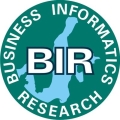6th Workshop on Information Logistics and Knowledge Supply
in conjunction with 12th International Conference on Business Informatics Research, BIR 2013
The field of information logistics and knowledge supply investigates methods, technologies and applications supporting demand-oriented and efficient information and knowledge provision in enterprises. In particular in knowledge-intensive industry and service sectors, information is a major factor in production processes, and knowledge reflects an important asset of the enterprise. Similarly, public organizations and governmental bodies are dependent on accurate and timely information supply for efficient and high quality processes and services. Intelligent information supply has become an important issue that is characterized by just-in-time, demand-oriented and context-sensitive information.
Experience shows that successful solutions for intelligent information supply involve several ingredients: a sound business case with clearly defined benefits and returns for the (networked) organization, a clear understanding of the user’s demand including the organizational context, and the right use of "enabling technologies” like semantic technologies, knowledge management or ubiquitous computing.
This workshop aims to bring together people who have strong interest in enterprise information systems, information logistics and knowledge supply. We invite researchers and practitioners from both industry and academia to submit original results of their completed or ongoing projects. We encourage broad understanding of possible approaches and solutions for information logistics and knowledge supply. Specific focus will be on practices and experiences of information logistics and knowledge supply, i.e. we encourage submission of case study and experiences papers, and of contributions bringing together business cases and enabling technologies.
The following topics are of relevance for the workshop:
• Challenges in information logistics and knowledge supply
• Information logistics and knowledge supply in small and medium sized enterprises
• Organisational implementations of information logistics and knowledge supply approaches
• Literature surveys and systematic literature analyses
• Concepts and architectures for intelligent information supply solutions
• Modeling of information processes and user demands
• Description languages for information demand and information services
• Business processes in information and knowledge management
• Economic effects and relevance (business cases)
• Business models for just-in-time information supply
• Metadata in information and knowledge management
• Active information systems
• Models for location and context
• Time based information delivery
• Concepts for self‑awareness of information distribution
• Location transparency
• Information handling in process contexts
• Infrastructures and approaches for knowledge supply
• eMaintenance and Information Logistics
• Experience reports about and show cases of information logistical applications
• Practices of information logistics and knowledge supply
Submissions to ILOG 2013 have to be made by using the submission systems EasyChair. All accepted workshop papers will be publishedin CEUR online proceedings. Furthermore, post-conference proceedings with improved versions of the papers will be published in print in Warsaw School of Economics faculty journal ( rocznikikae.sgh.waw.pl. Papers submitted need to follow LNBIP formatting guidelines available from springer.com
Papers shall not have more than twelve pages (including figures, tables and appendices). Longer papers will not be included in workshop proceedings.
Important dates
• Submission deadline: July 10 July 26
• Notification of acceptance – August 16
• Camera ready deadline – August 31
• Workshop date – September 23
Program committee chairs
Kurt Sandkuhl, University of Rostock (Germany) (chair)
Ulf Seigerroth, Jönköping University (Sweden) (co-chair)
Program committee (preliminary)
Clara Bassano, “Parthenope” University of Naples (Italy)
Andreas Billig, Fraunhofer ISST Berlin (Germany)
Eva Blomqvist, CNR-ISTC (Italy)
Tobias Bucher, PHOENIX group (Germany)
Susanne Busse, FH Brandenburg (Germany)
Albertas Caplinskas Institute of Mathematics and Informatics (Lithuania)
Barbara Dinter, University of St.Gallen (Switzerland)
Henrik Eriksson, Univ. Linköping (Sweden)
Janis Grabis, Riga Technical University (Latvia)
Darek Haftor, Linnæus University (Sweden)
Yanbo Han, Inst. Computing Techn., Chin. Acad. of Science (China)
Tomasz Kaczmarek, Poznan University of Economics (Poland)
Mira Kajko-Mattsson, Stockholm University (Sweden)
Ramin Karim, Luleå University of Technology (Sweden)
Peter Kawalek, University of Manchester (United Kingdom)
Wolfgang Deiters, Fraunhofer ISST (Germany)
Ralf D. Kutsche, TU Berlin (Germany)
Tatiana Levashova, St. Petersburg Institute Inform. & Autom. (Russia)
Paolo Piciocchi, University of Salerno (Italy)
Ulf Seigerroth, Jönköping International Business School (Sweden)
Alexander Smirnov, St. Petersburg Institute Inform. & Autom. (Russia)
Janis Stirna, Stockholm University (Sweden)
Vladimir Tarasov, Jönköping University (Sweden)
Jan Willem, Nashuatec/Ricoh Group (Netherlands)

